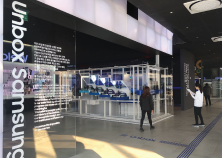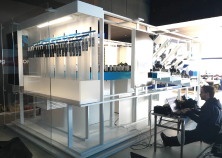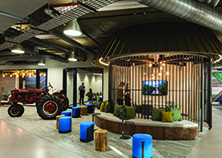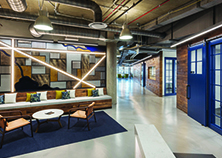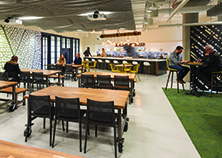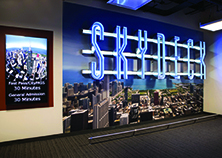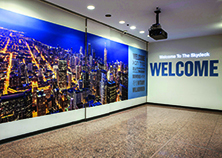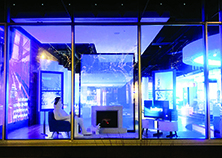Samsung Tellart Olympic Pavilion
International experiential agency Tellart knew that the 2018 Winter Olympics was the perfect venue to showcase Samsung’s new phones and emphasize the firm’s renewed commitment to superior quality manufacturing to an international audience of potential customers.
Tellart worked with design firm 2x4, to create the “UNBOX Samsung” concept, a customer experience within the Samsung Olympics Pavilion.
Then they asked Chicago Scenic to bring that concept to life and present a quick and transparent look at Samsung’s high-tech, high-quality process. The result was a 3-stage, 10-foot by 20-foot glass-enclosed factory display that captured guests’ attention.
Working together, Tellart and CSSI brought the Unbox Samsung design to life. “Our goal was to re-think standard exhibit fabrication techniques in order to take into account all the constraints of creating a high tech structure while maintaining the flexibility and function required of a temporary exhibit at the Samsung Olympic showcase pavilion,” said CSSI Senior Project Manager Jim Mallerdino. “The key was to maintain the design aesthetic while allowing for component level breakdown, shipping, and setup multiple times over the exhibits life”.
The manufacturing line demonstrates milling the phone’s aluminum form, anodizing it via a chemical bath, then installing the phone’s glass face, emphasizing that Samsung manufactures all of its own glass. The completely-automated process includes a mesmerizing bright white articulating robotic arm that seamlessly moves the phone through the glass installation stage. All the while multiple mini conveyor belts ran in the background demonstrating a phone's movement through the factory production line and ending with a series of completed phones presented within a jewelry store-type showcase.
The team had less than two months to create and automate the “factory”. As a result, Tellart’s tech experts spent more than a week at Chicago Scenic’s facility running the assembly line and burning in the controlling software and mechanical components prior to shipping. The process, Mallerdino said, was rigorous. But working closely, both teams ensured that the integration of components and structure was seamless, reliable, and repeatable – a must for the exhibit’s constant operation.
The hard deadlines fell right at the December holidays with no ‘wiggle’ room. In addition, the disassembled “factory” and components needed to be shipped to South Korea with ample time to clear the lengthy customs process and pass the Olympics’ rigorous security process. Chicago Scenic’s project lead Seth Knudson traveled with the exhibit to oversee the successful installation onsite.


